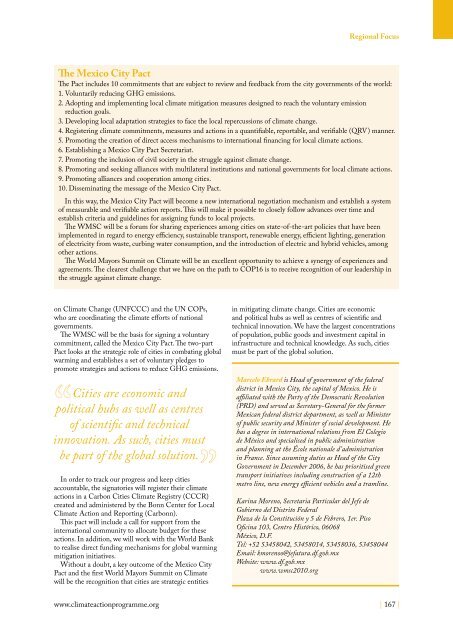Climate Action 2010-2011
Create successful ePaper yourself
Turn your PDF publications into a flip-book with our unique Google optimized e-Paper software.
Regional Focus<br />
The Mexico City Pact<br />
The Pact includes 10 commitments that are subject to review and feedback from the city governments of the world:<br />
1. Voluntarily reducing GHG emissions.<br />
2. Adopting and implementing local climate mitigation measures designed to reach the voluntary emission<br />
reduction goals.<br />
3. Developing local adaptation strategies to face the local repercussions of climate change.<br />
4. Registering climate commitments, measures and actions in a quantifiable, reportable, and verifiable (QRV) manner.<br />
5. Promoting the creation of direct access mechanisms to international financing for local climate actions.<br />
6. Establishing a Mexico City Pact Secretariat.<br />
7. Promoting the inclusion of civil society in the struggle against climate change.<br />
8. Promoting and seeking alliances with multilateral institutions and national governments for local climate actions.<br />
9. Promoting alliances and cooperation among cities.<br />
10. Disseminating the message of the Mexico City Pact.<br />
In this way, the Mexico City Pact will become a new international negotiation mechanism and establish a system<br />
of measurable and verifiable action reports. This will make it possible to closely follow advances over time and<br />
establish criteria and guidelines for assigning funds to local projects.<br />
The WMSC will be a forum for sharing experiences among cities on state-of-the-art policies that have been<br />
implemented in regard to energy efficiency, sustainable transport, renewable energy, efficient lighting, generation<br />
of electricity from waste, curbing water consumption, and the introduction of electric and hybrid vehicles, among<br />
other actions.<br />
The World Mayors Summit on <strong>Climate</strong> will be an excellent opportunity to achieve a synergy of experiences and<br />
agreements. The clearest challenge that we have on the path to COP16 is to receive recognition of our leadership in<br />
the struggle against climate change.<br />
on <strong>Climate</strong> Change (UNFCCC) and the UN COPs,<br />
who are coordinating the climate efforts of national<br />
governments.<br />
The WMSC will be the basis for signing a voluntary<br />
commitment, called the Mexico City Pact. The two-part<br />
Pact looks at the strategic role of cities in combating global<br />
warming and establishes a set of voluntary pledges to<br />
promote strategies and actions to reduce GHG emissions.<br />
Cities are economic and<br />
political hubs as well as centres<br />
of scientific and technical<br />
innovation. As such, cities must<br />
be part of the global solution.<br />
In order to track our progress and keep cities<br />
accountable, the signatories will register their climate<br />
actions in a Carbon Cities <strong>Climate</strong> Registry (CCCR)<br />
created and administered by the Bonn Center for Local<br />
<strong>Climate</strong> <strong>Action</strong> and Reporting (Carbonn).<br />
This pact will include a call for support from the<br />
international community to allocate budget for these<br />
actions. In addition, we will work with the World Bank<br />
to realise direct funding mechanisms for global warming<br />
mitigation initiatives.<br />
Without a doubt, a key outcome of the Mexico City<br />
Pact and the first World Mayors Summit on <strong>Climate</strong><br />
will be the recognition that cities are strategic entities<br />
in mitigating climate change. Cities are economic<br />
and political hubs as well as centres of scientific and<br />
technical innovation. We have the largest concentrations<br />
of population, public goods and investment capital in<br />
infrastructure and technical knowledge. As such, cities<br />
must be part of the global solution.<br />
Marcelo Ebrard is Head of government of the federal<br />
district in Mexico City, the capital of Mexico. He is<br />
affiliated with the Party of the Democratic Revolution<br />
(PRD) and served as Secretary-General for the former<br />
Mexican federal district department, as well as Minister<br />
of public security and Minister of social development. He<br />
has a degree in international relations from El Colegio<br />
de México and specialised in public administration<br />
and planning at the École nationale d’administration<br />
in France. Since assuming duties as Head of the City<br />
Government in December 2006, he has prioritised green<br />
transport initiatives including construction of a 12th<br />
metro line, new energy efficient vehicles and a tramline.<br />
Karina Moreno, Secretaria Particular del Jefe de<br />
Gobierno del Distrito Federal<br />
Plaza de la Constitución y 5 de Febrero, 1er. Piso<br />
Oficina 103, Centro Histórico, 06068<br />
México, D.F.<br />
Tel: +52 53458042, 53458014, 53458036, 53458044<br />
Email: kmorenoo@jefatura.df.gob.mx<br />
Website: www.df.gob.mx<br />
www.wmsc<strong>2010</strong>.org<br />
www.climateactionprogramme.org | 167 |












